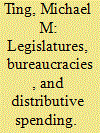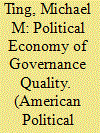| Srl | Item |
| 1 |
ID:
113557


|
|
|
|
|
| Publication |
2012.
|
| Summary/Abstract |
This article develops a theory of bureaucratic influence on distributive politics. Although there exists a rich literature on the effects of institutions such as presidents, electoral systems, and bicameralism on government spending, the role of professional bureaucrats has yet to receive formal scrutiny. In the model, legislators bargain over the allocation of distributive benefits across districts. The legislature may either "politicize" a program by bargaining directly over pork and bypassing bureaucratic scrutiny, or "professionalize" it by letting a bureaucrat approve or reject project funding in each district according to an underlying quality standard. The model predicts that the legislature will professionalize when the expected program quality is high. However, politicization becomes more likely as the number of high-quality projects increases and under divided government. Further, more competent bureaucrats can encourage politicization if the expected program quality is low. Finally, politicized programs are larger than professionalized programs.
|
|
|
|
|
|
|
|
|
|
|
|
|
|
|
|
| 2 |
ID:
179005


|
|
|
|
|
| Summary/Abstract |
This paper develops a dynamic theory of the social and political foundations of governance quality. In the model, groups of citizens have different expected needs for a public service, and citizens choose whether to demand service when the need arises. Politicians representing these groups can determine policy benefits and delegate to bureaucrats the ability to invest in long-run service quality. The main feature of the theory is its foundation for citizen–government interactions, which draws from well-known queueing models of organizational service provision. The model provides a framework for characterizing the effectiveness and durability of government programs. A main implication is that politicized bureaucracies improve program survivability and increase the frequency of investment, while insulated bureaucracies increase the intensity of investment; overall service quality trades off between these two factors. Other results examine the implications of cross-group inequality, electoral conditions, and decentralization.
|
|
|
|
|
|
|
|
|
|
|
|
|
|
|
|